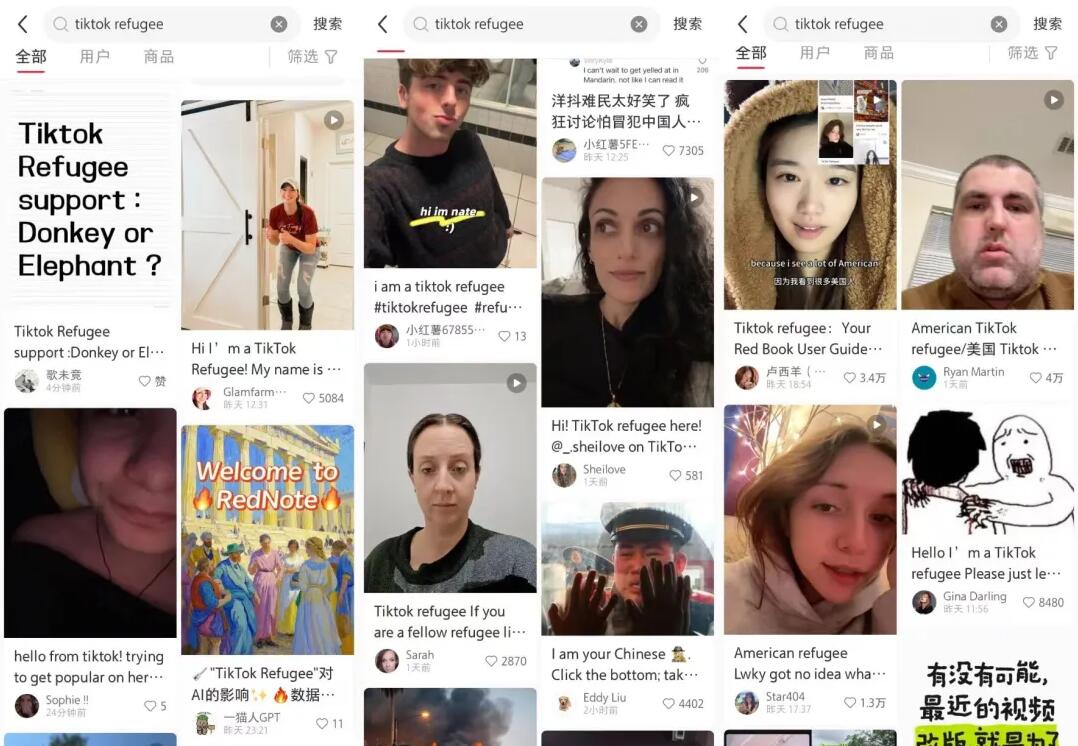“TikTok Refugees” Flock to RedNote: An Unexpected People-to-People Exchange

In a well-regulated, reasonable, and peaceful public discourse environment, ‘TikTok refugees’ and Chinese netizens can largely build constructive and positive relations.
In this rapidly changing internet age, we constantly witness phenomena that are both comical and yet profoundly meaningful. Now, with the imminent official ban of TikTok in the United States, a large group of U.S. TikTok users find themselves “forced into exile,” and have flooded Xiaohongshu (RedNote), a Chinese social media platform, to speak out and continue their careers as content creators there. They jokingly call themselves “TikTok refugees”, and in this unexpected “migration”, they have embarked on a fascinating journey to discover China’s charm.
As a foreign “native” who roams across multiple Chinese internet platforms, I am both surprised and delighted by this “migratory flow”. I’m surprised at how suddenly and amusingly American netizens have come into such close contact with the Chinese internet community. I’m delighted because, with a grounded and respectful attitude, they are beginning to explore the most authentic and appealing aspects of China.
It must be said that the U.S. is shooting itself in the foot to ban TikTok. Behind this ban lie trumped-up charges and the demonization of China. The senior U.S. officials and think tanks appear to be full of ignorance and misunderstanding when it comes to China, lacking in true experts on China and the ability to think logically in policy-making. TikTok has met all the requirements of the U.S. regulations and laws, even the unreasonable ones, yet in the end, it still could not avoid being banned. As the U.S. itself would put it, this is nothing but a witch-hunting exercise.
However, this witch-hunt has unexpectedly prompted overseas users to explore the Chinese internet. They have discovered that besides TikTok, there are a variety of social media platforms in China where they can express themselves, and the overall ecosystem is far more balanced and positive than what they see in Western media. Here, they can freely voice their opinions, share their lives, and feel the warmth and inclusiveness of people from different cultural backgrounds.
As the saying goes, gold will always shine. China’s national image, long suppressed by Western media, has suddenly been recognized by many foreigners through the natural exchange facilitated by the internet. The most genuine, down-to-earth, and approachable aspects of China stand in stark contrast to the demonizing conspiracy theories long propagated by Western media. This authentic interaction allows foreign netizens to see a different China—a nation full of vitality and innovative spirit.

Of course, as there is still a unilateral cognitive warfare initiated by the West, misunderstandings between China and the West inevitably exist. Nevertheless, in a well-regulated, reasonable, and peaceful public discourse environment, “TikTok refugees” and Chinese netizens can largely build constructive and positive relations. Such interaction not only helps deepen mutual understanding and friendship but also promotes cultural exchanges and integration.
It’s hard to tell whether the wave of Xiaohongshu and “TikTok refugees” will be a flash in the pan or a phenomenon that will play out in the long run. But one thing is certain: this can be viewed as a landmark event. It signifies the weakening grip of Western social media platforms and overall dominance in public opinion, paving the way for a more pluralistic international discourse environment.
Finally, the influx of “TikTok refugees” on Xiaohongshu sheds light on an important fact: young people, regardless of nationality, can still communicate effectively and feel the joy of communication on a benign, non-political platform, even if they don’t share a common language. All it takes is a pure sense of curiosity and the help of translation software. This kind of communication across borders is an essential step in building a global community with a shared future for humanity.
Therefore, even if the positive interactions between American and Chinese internet users finally turn out to be a passing pad, all of us participating in this space should strive to protect this unexpected but wonderful environment. Let us join hands and work together to build a more harmonious, inclusive, and pluralistic internet world.
The author is a PhD candidate at the School of International Relations and Public Affairs, Fudan University.
The article reflects the author’s opinions, and not necessarily the views of China Focus.
 Facebook
Facebook
 Twitter
Twitter
 Linkedin
Linkedin
 Google +
Google +










